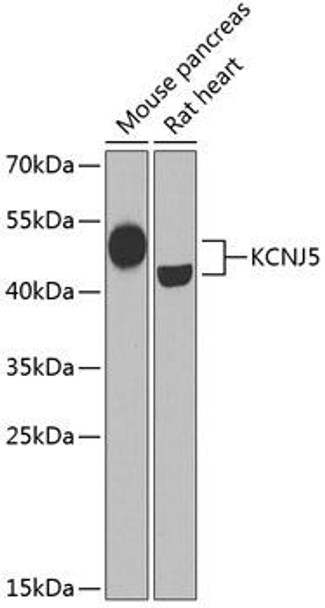Signal Transduction Antibodies 3
Anti-KCNJ5 Antibody (CAB6232)
- SKU:
- CAB6232
- Product Type:
- Antibody
- Reactivity:
- Human
- Reactivity:
- Mouse
- Reactivity:
- Rat
- Host Species:
- Rabbit
- Isotype:
- IgG
- Antibody Type:
- Polyclonal Antibody
- Research Area:
- Signal Transduction
Description
| Antibody Name: | Anti-KCNJ5 Antibody |
| Antibody SKU: | CAB6232 |
| Antibody Size: | 20uL, 50uL, 100uL |
| Application: | WB |
| Reactivity: | Human, Mouse, Rat |
| Host Species: | Rabbit |
| Immunogen: | A synthetic peptide corresponding to a sequence within amino acids 50-150 of human KCNJ5 (NP_000881.3). |
| Application: | WB |
| Recommended Dilution: | WB 1:500 - 1:2000 |
| Reactivity: | Human, Mouse, Rat |
| Positive Samples: | Mouse pancreas, Rat heart |
| Immunogen: | A synthetic peptide corresponding to a sequence within amino acids 50-150 of human KCNJ5 (NP_000881.3). |
| Purification Method: | Affinity purification |
| Storage Buffer: | Store at -20'C. Avoid freeze / thaw cycles. Buffer: PBS with 0.02% sodium azide, 50% glycerol, pH7.3. |
| Isotype: | IgG |
| Sequence: | RQRY MEKS GKCN VHHG NVQE TYRY LSDL FTTL VDLK WRFN LLVF TMVY TVTW LFFG FIWW LIAY IRGD LDHV GDQE WIPC VENL SGFV SAFL FSIE TETT I |
| Gene ID: | 3762 |
| Uniprot: | P48544 |
| Cellular Location: | Membrane, Multi-pass membrane protein |
| Calculated MW: | 47kDa |
| Observed MW: | 47kDa |
| Synonyms: | KCNJ5, CIR, GIRK4, KATP1, KIR3.4, LQT13 |
| Background: | Potassium channels are present in most mammalian cells, where they participate in a wide range of physiologic responses. The protein encoded by this gene is an integral membrane protein and inward-rectifier type potassium channel. The encoded protein, which has a greater tendency to allow potassium to flow into a cell rather than out of a cell, is controlled by G-proteins. It may associate with two other G-protein-activated potassium channels to form a heteromultimeric pore-forming complex. |
| UniProt Protein Function: | GIRK4: This potassium channel is controlled by G proteins. Inward rectifier potassium channels are characterized by a greater tendency to allow potassium to flow into the cell rather than out of it. Their voltage dependence is regulated by the concentration of extracellular potassium; as external potassium is raised, the voltage range of the channel opening shifts to more positive voltages. The inward rectification is mainly due to the blockage of outward current by internal magnesium. Can be blocked by external barium. Defects in KCNJ5 are the cause of long QT syndrome type 13 (LQT13). It is a heart disorder characterized by a prolonged QT interval on the ECG and polymorphic ventricular arrhythmias. They cause syncope and sudden death in response to excercise or emotional stress, and can present with a sentinel event of sudden cardiac death in infancy. Defects in KCNJ5 are the cause of familial hyperaldosteronism type 3 (FH3). A form of hyperaldosteronism characterized by hypertension secondary to massive adrenal mineralocorticoid production. Like patients with familial hyperaldosteronism type 1 (glucocorticoid-remediable aldosteronism), patients with FH3 present with childhood hypertension, elevated aldosteronism levels, and high levels of the hybrid steroids 18-oxocortisol and 18-hydroxycortisol. However, hypertension and aldosteronism are not reversed by administration of exogenous glucocorticoids and patients require adrenalectomy to control hypertension. Somatic mutations in KCNJ5 have been found in aldosterone-producing adrenal adenomas and can be responsible for aldosteronism associated with cell autonomous proliferation. These are typically solitary, well circumscribed tumors diagnosed between ages 30 and 70. They come to medical attention due to new or worsening hypertension, often with hypokalemia. KCNJ5 mutations produce increased sodium conductance and cell depolarization, which in adrenal glomerulosa cells produces calcium entry, the signal for aldosterone production and cell proliferation. Belongs to the inward rectifier-type potassium channel (TC 1.A.2.1) family. KCNJ5 subfamily. |
| UniProt Protein Details: | Protein type:Membrane protein, multi-pass; Membrane protein, integral; Channel, potassium Chromosomal Location of Human Ortholog: 11q24 Cellular Component: voltage-gated potassium channel complex; plasma membrane Molecular Function:protein binding; G-protein activated inward rectifier potassium channel activity; inward rectifier potassium channel activity Biological Process: synaptic transmission; potassium ion import; potassium ion transport Disease: Hyperaldosteronism, Familial, Type Iii; Long Qt Syndrome 13 |
| NCBI Summary: | Potassium channels are present in most mammalian cells, where they participate in a wide range of physiologic responses. The protein encoded by this gene is an integral membrane protein and inward-rectifier type potassium channel. The encoded protein, which has a greater tendency to allow potassium to flow into a cell rather than out of a cell, is controlled by G-proteins. It may associate with two other G-protein-activated potassium channels to form a heteromultimeric pore-forming complex. [provided by RefSeq, Jul 2008] |
| UniProt Code: | P48544 |
| NCBI GenInfo Identifier: | 296434543 |
| NCBI Gene ID: | 3762 |
| NCBI Accession: | P48544.2 |
| UniProt Secondary Accession: | P48544,Q6DK13, Q6DK14, Q92807, B2R744, |
| UniProt Related Accession: | P48544 |
| Molecular Weight: | 419 |
| NCBI Full Name: | G protein-activated inward rectifier potassium channel 4 |
| NCBI Synonym Full Names: | potassium inwardly-rectifying channel, subfamily J, member 5 |
| NCBI Official Symbol: | KCNJ5 |
| NCBI Official Synonym Symbols: | CIR; GIRK4; KATP1; LQT13; KIR3.4 |
| NCBI Protein Information: | G protein-activated inward rectifier potassium channel 4; IRK-4; heart KATP channel; inward rectifier K+ channel KIR3.4; cardiac ATP-sensitive potassium channel |
| UniProt Protein Name: | G protein-activated inward rectifier potassium channel 4 |
| UniProt Synonym Protein Names: | Cardiac inward rectifier; CIR; Heart KATP channel; Inward rectifier K(+) channel Kir3.4; IRK-4; KATP-1; Potassium channel, inwardly rectifying subfamily J member 5 |
| Protein Family: | G protein-activated inward rectifier potassium channel |
| UniProt Gene Name: | KCNJ5 |
| UniProt Entry Name: | KCNJ5_HUMAN |
View AllClose







